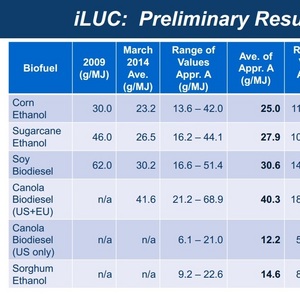RFA hammers CARB on lack of ILUC transparency

California ARB October 2104 presentation
October 16, 2014
BY Renewable Fuels Association
Bob Dinneen, president and CEO of the Renewable Fuels Association, recently submitted a letter to the California Air Resources Board outlining “serious concerns about the openness, transparency, and scientific integrity of staff’s new indirect land use change (ILUC) analysis for the California Low Carbon Fuel Standard (LCFS).” The letter follows a Sept. 29 workshop in which CARB staff revealed that it is planning to disregard the latest published research on ILUC, maintain disproven and faulty assumptions, and ignore stakeholder comments received in the spring.
RFA, along with approximately 40 other stakeholders, submitted detailed technical comments in April aimed at improving CARB’s analysis, but “it was abundantly clear that the information submitted by stakeholders in the spring had been wholly disregarded” by the time CARB held its September public workshop. CARB staff gave no reason as to why it ignored the comments “even when stakeholders explicitly asked for staff’s rationale for ignoring new information.” CARB staff also remained vague about future plans to examine the new information. Because CARB staff failed to explain why it disregarded the technical comments submitted by RFA in April, the extensive comments were re-submitted.
Advertisement
Moreover, Dinneen’s letter highlighted CARB staff’s misguided belief that it is “not productive” to examine real-world data concerning agricultural land use. Dinneen remarked that, “Any objective scientist would find it prudent to examine the real-world data to determine whether predictive model results agreed with actual observed outcomes… Certainly, it is difficult to disentangle the real-world impact of biofuels expansion from the effects of other factors on actual global land use—but that does not mean CARB staff shouldn’t at least attempt to ground-truth its predictive results against real-world data.”
As an example of the disconnect between CARB’s ILUC modeling results and the real world, Dinneen noted that CARB’s model predicted that roughly 100,000 hectares of forest would be converted to cropland for biofuels production between 2001 and 2015. But real-world data show no U.S. forest loss has occurred; instead, U.S. forestland has grown 7 million hectares since 2001.
Advertisement
Dinneen concluded by calling on CARB to ensure its staff is transparent in its decision making and responsive to legitimate stakeholder concerns, stating, “We urge you to ensure that the CARB staff responsible for the ILUC analysis are held accountable for their decisions and abide by the agency’s long-standing norms for science-based rulemaking.”
The full letter can be found here.
Related Stories
President Trump on July 4 signed the “One Big Beautiful Bill Act.” The legislation extends and updates the 45Z credit and revives a tax credit benefiting small biodiesel producers but repeals several other bioenergy-related tax incentives.
CARB on June 27 announced amendments to the state’s LCFS regulations will take effect beginning on July 1. The amended regulations were approved by the agency in November 2024, but implementation was delayed due to regulatory clarity issues.
SAF Magazine and the Commercial Aviation Alternative Fuels Initiative announced the preliminary agenda for the North American SAF Conference and Expo, being held Sept. 22-24 at the Minneapolis Convention Center in Minneapolis, Minnesota.
Saipem has been awarded an EPC contract by Enilive for the expansion of the company’s biorefinery in Porto Marghera, near Venice. The project will boost total nameplate capacity and enable the production of SAF.
Global digital shipbuilder Incat Crowther announced on June 11 the company has been commissioned by Los Angeles operator Catalina Express to design a new low-emission, renewable diesel-powered passenger ferry.
Upcoming Events










